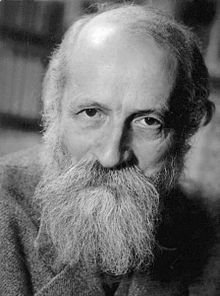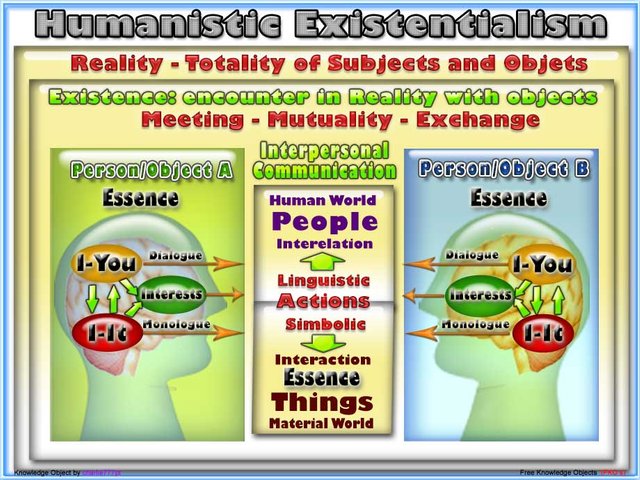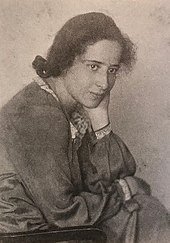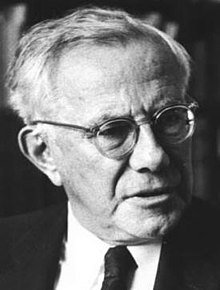Part 2 - The Short History of Existentialism: IV - Humanistic Existentialists - Buber, Arendt, and Tillich
The Dialectics of Liberation: Anarchism, Existentialism, and Decentralism.
Part 2 - The Short History of Existentialism: IV - Humanistic Existentialists - Buber, Arendt, and Tillich
"The inner dreams of Being command life" - charlie777pt
1 - Introduction
"He that endeavors to enter into the Philosophers' Rosary without a key, is like him who would walk without feet" - Michael Maier in Atlanta Fugiens, (1617)
One of the first humanist thinkers was Erasmus (1466-1536), preaching against religious education of adults because they have a responsible moral in free will and reasoning will, and that society misteaches children about their already natural goodness, as well as, treat them with forced imposition, spoiling its normal staging of evolution.
These ideas were prolonged by the educational philosophy of Rousseau (1712-1778) and Pestalozzi emphasizing the natural human kindness, the flower of the born capacity to sense and reason about the world by learning the process of controlling our destiny without constraints to affirm the personal freedom to choose under the burden of the responsibility.
In the humanistic point of view, Freedom is a property of every born man and women have this natural inalienable right as a goal of the human consortium that he/she is a part of, to find a reason for Existence, and develop their maximum capabilities, to participate in the building a more humane society.
Most of the main philosophers of humanistic existentialism had religious beliefs, but their ethical life posture was separated from theism and refused supernatural representations of reality, putting science and rationalization overriding religious dogmas and beliefs.
Humanism as an individualist view, that reality is shaped by the free will of every person, in a self-improved building of our natural born values and responsibility in an ethical mutual aid based humanity searching for its truth and place in the Universe.
Some humanists try a more collectivist approach based the community needs' view to be counterbalanced with individuals rights.
2 - Humanistic Existentialists - Buber, Arendt, and Tillich
Buber and Tillich died in 1965, and they couldn't see Existentialism in the streets in 68, as an active philosophy, a praxis rioting in the streets to change reality.
|
Martin Buber was a prolific author and a political activist mingling philosophy and religious mysticism, theological phenomenology, education, politics, as well as art, well became well known by his book I and Thou.
The early influences of Buber are Kant's definition of space and time as human intuition and sensed perceptions, Nietzsche's vitalist concepts of free will, the lived experience and the human wholeness, and Schopenhauer with the power to project ourselves in the running reality in an epic or heroic way.
Buber's early roots was Kant's transcendental idealism and Nietzsche's Zarathustra, using the former to solve the mystery that our Being transcends space and time and is based on human intuition organizing perceptions in chaos, and he uses the latter to shape the concept of the power of the will in an individualistic-centered view, to project our global capabilities and standards.
He broke with his Jewish family tradition to pursue the study of philosophy, becoming well known for his dialogical existence, with the modes of being in dialogue as I-Thou or I-You (Ich-Du) or in monologue as I-It (Ich-Es), emphasizing the interpersonal nature of communication as meeting, dialogue, mutuality, and exchange linguistically or symbolically.
“All real living is meeting.” ― Martin Buber in I and Thou
He followed Feuerbach and Kierkegaard, and portrayed our Existence as an encounter in reality with objects ( people and things), using the theological of the I-You and the I-It (mental representations) as modes of consciousness and being in the actualization of that Existence, that he extends to the relationship with God.
I-It is also the view of the world is centered in the Self with direction to the objects based in interest, more like a relationship with oneself, and the Y-You relation, in encounters between subjects that goes beyond the subject-object relation of Descartes.
Buber said we live between in both poles dominance, and he saw the empoverishing relationships in the new materialistic view of the modern world centering people in the I-It as a progressive dominant axis of actual life that leads to dehumanization and loneliness.
“The real struggle is not between East and West, or capitalism and communism, but between education and propaganda.” - Martin Buber
|
Johanna "Hannah" Cohn Arendt, was a philosopher and author in political theories and epistemology, with a preoccupation with the black shadow of totalitarianism, and oriented with the early influences from his professor and boyfriend for a short while Martin Heidegger, and later she finished her doctorate with Karl Jaspers.
"This is the precept by which I have lived: Prepare for the worst; expect the best, and take what comes." - Hannah Arendt
She was raised in Jewish progressive cultural environment, in Germany, and before World War II she is was confronted with anti-semitism that she investigated and for that, she was arrested by the Gestapo in 1933, and in 1937 she loses her German nationality, and in 1940 she is jailed by the French.
In 1941, she decides to escape to America passing through Portugal, getting her citizenship in 1950, and one year later she gets noticed with his book The Origins of Totalitarianism and in 1958 the work The Human Condition.
Surely as a reflex of his troubled life of Nazi harassment and later persecutions, so she wrote about the relation between power and evil of the authoritarianism, and about the political benefits of direct democracy and the concept of citizenship as activism and involvement active to avoid the risk of government's takeover personal freedom.
She already knew that modern societies were converting democracy into a more administrative participative bureaucracy, transformed in the actual entropic technocracy were the main beneficiaries dictate the rules and financial flows, where there is no place for a free world, urging us to question our inner concepts of self-determination to make a revolution, using our willpower and freedom based on our own thoughts and judgment.
She makes a distinction between power and violence, seeing the later as anti-ethical extremist manifestations of the former, which should be based in the collective choices that can't be imposed by violent means and naming bureaucracy ("rule by no one") as an aggressive machinery that do not listen to the people ruled by it.
Violence disappears when power is zero...!!! Life is ephemerous, let's stop now the cancer of the malign virus of power.
"Economic growth may one day turn out to be a curse rather than a good, and under no conditions can it either lead into freedom or constitute a proof for its existence." - Hannah Arendt
|
First of all my views about Paul Tillich are limited by the references of other correlated authors, because in my youth I couldn't waste any time with the transcendence of religious faith and God(s), but I will mention him for its historical influences in the sake of my love for the subject of existentialism and the respect of anyone's opinions.
Paul Johannes Tillich was a Christian existentialist philosopher as well as a Protestant Lutheran, that became one of the most influential theologists of the last century, introducing the relationships between the Christian revelations and the to solve the dilemmas of human nature and existence.
In 1933 the Nazi government, destitute Tillich from his professorship of Philosophy in the University of Frankfurt, making one more human being that emerged from the oppression of fascism and totalitarianism that marked of the lives of the last centuries of the most influential artists, writers, and philosophers of the XXth century.
Any way, what I learned about him by other's authors angles of his work in the existentialist vein, starting by the title of his book that I really like- The Courage to Be - showing his philosophical concepts of ontology (the domain of being) and its human finitude, and try the bridge to the Christian dogmas of revelation of theology.
His approach to me is like using the concept of Heaven to solve the Hell generated by human greed and consequent violence and is just a veil to hide from our inner force and to stop us to make a safe haven on Earth for a fulfilled universal guidance pillared in humanity's values.
"Loneliness expresses the pain of being alone and solitude expresses the glory of being alone." - Paul Tillich
Humanist sees morality as a natural cause of our relation with other people focused on the objective of mutual goals and benefits as the best game choice based in an ethical approaching of desiring to others the best we wish ourselves, to build a free humane society of unselfish and caring human beings.
Here's the first post on the Existentialist Humanists Buber, Arendt, and Tillich, to end the next article with Rollo May and Abraham Maslow.
Photo sources: Wikipedia
The Dialectics of Liberation: Anarchism, Existentialism and Decentralism.
Published Posts:
Introduction to the Dialectics of Liberation: Anarchism, Existentialism and Decentralism
I - Anarchism
- What is Anarchism?
- The History of Anarchism
- Part 1 - Pre-Anarchy - Social Revolution
- Anarchy: Revolution Against The State
- Anarchy Today
- Index and Conclusions of part 1 - Anarchy
II - Existentialism
- What is Existentialism ?
- Part 1 - Unplugged Introduction to Existentialism
- Part 2 - The Short History of Existentialism: I - Early Pre-existentialism
- Part 2 - The Short History of Existentialism: II - Pre-Existentialists
- Part 2 - The Short History of Existentialism: III - Phenomenology - Brentano to Husserl
- Part 2 - The Short History of Existentialism: III - Phenomenology - Jaspers to Sheller
- Part 2 - The Short History of Existentialism: IV - Humanistic Existentialists - Buber, Arendt, and Tillich - This post
Next posts on the Series:
II - Existentialism(Cont.)
- What is Existentialism ? (Cont.)
- Part 2 - The Short History of Existentialism: V - Humanistic Existentialists - Rollo May
- Part 2 - The Short History of Existentialism: V - Humanistic Existentialists - Abraham Maslow
- Part 2 - The Short History of Existentialism: VI - Post -Structuralism
- Part 3 - The Philosophy of Existentialism: I - The Meaning of Nonsense
- Part 4 - The Fear of Freedom of Erich Fromm
- The "Existentialists"
- Part 1 - The Players and the Times
- Part 2 - Jean Paul Sartre - the Man of The 20th Century
- Humanism and Existentialism
- Existentialism and Anarchism
- The Future : Posthumanism, transhumanism and inhumanism
III - Decentralism
- What is Decentralism?
- The Philosophy of Decentralism
- Blockchain and Decentralization
- Anarchism, Existentialism, and Decentralism
IV - Dialectic for Self-Liberation
- The Dialectics of Liberation Congress
- Psychedelics, Libertarian and artistical movements
- Psychoanalysis and Existentialism
- The Anti-psychiatry movement




a very extraordinary work,i really admire your work my brother,i have to learn a lot from you,@charlie777pt
Thanks a lot for your motivational comment, and I hope people that read my work about the dialectics of liberation find some useful liberation tools to dig deeper in their selves.
thank your welcome friend,thank for sharing.
I liked the statement of Tillich about God- " between God and the world there is a void,a gap that hides God from the eyes of people,makes it impossible for a person to see God and talk to him"